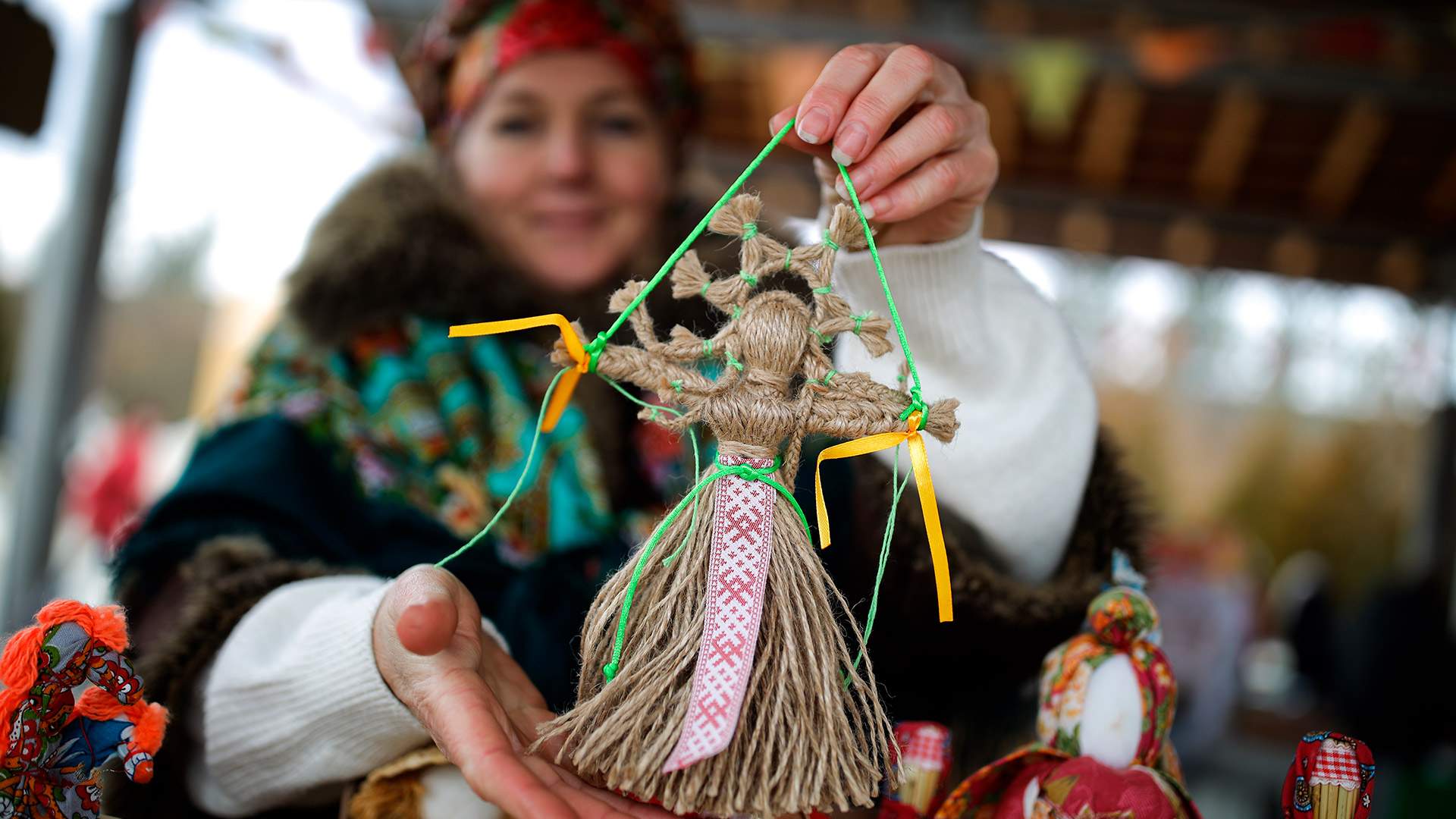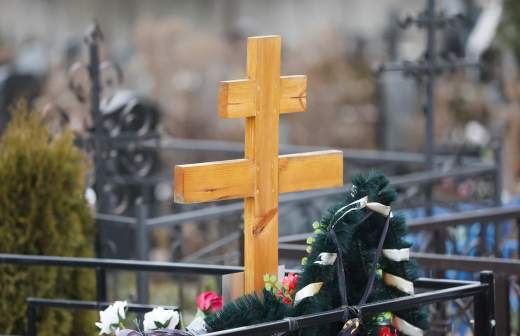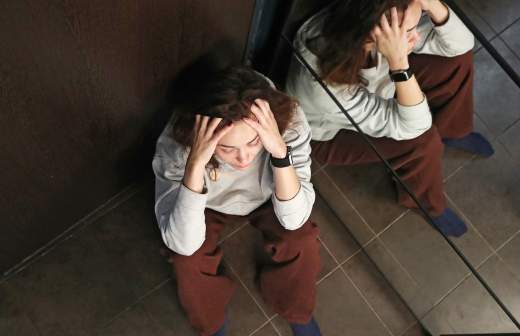Pancake week: special omens and superstitions

On Monday, Russia begins celebrating Maslenitsa, a folk festivity dedicated to seeing off winter and welcoming spring. Every year the holiday is celebrated for seven days, each of which is usually marked by special rituals. In Russia, young people in the days of the holiday participated in folk amusements, and housewives prepared the traditional Shrovetide treat - ruddy pancakes. In Orthodoxy, Shrovetide week is called Cheese Week or Meat Feast Week. During the holidays it was allowed to eat dairy products, but meat was excluded from the diet, preparing for the onset of Lent. When Pancake Day appeared, by what traditions met spring in Russia and when celebrate the folk holiday in 2025 - tell "Izvestia".
Pancake Day 2025: what kind of holiday, why so called
Maslenitsa is an ancient Slavic holiday, which appeared in Russia back in pagan times. There are several versions of what exactly the event was dedicated to the holiday. Initially, the celebration was timed to the day of the vernal equinox, which was celebrated at the end of March. Then Pancake Day symbolized the end of a protracted winter and the long-awaited arrival of spring.
One version says that the holiday was organized in honor of the Slavic pagan deity Yarilo, who was revered as the god of the sun, fertility and love. According to another version, the celebration was organized in honor of the fertility god Veles - the patron saint of cattle and agriculture. For the ancient Slavs Pancake Day was a transitional period - the beginning of a new year. To placate the gods and get a good harvest in the new year, ancestors held special rituals. One of them was associated with the funeral of a straw effigy, symbolizing the evil winter. During seven days around it organized fun festivities, after which the effigy was burned on a large fire, accompanying the ritual with ritual songs. It was believed that this helped to chase away the cold weather. In addition, in the olden days on Pancake Day organized fist fights, skating with ice slides, round dances and went to visit each other. The ancestors believed that the louder and more cheerful Pancake Day would be, the more fertile the year would be.
After the adoption of Christianity in Russia, Pancake Day became a national Orthodox holiday. The celebration began to be celebrated about eight weeks before Easter. Also Pancake week became the last stage of preparation for Lent, so Shrovetide week was called Cheese Week or Meat-Leave Week (week). During this period it was allowed to eat dairy products and fish, but meat was not allowed. It was important to prepare for the fast not only physically, but also spiritually. That is why one could not swear, swear profanely or harbor grudges. It was important to solve all the conflicts and repent for your sins to start fasting with a relieved soul.
Shrovetide in 2025: when it begins and ends
In 2025, the celebration of Shrovetide will begin on Monday, February 24, and will end on Sunday - March 2. Immediately after the end of Shrovetide festivities will come Lent, which this year will last 48 days - from March 3 to April 19, after which will come the main Christian holiday - the Bright Resurrection of Christ. In 2025, both Orthodox and Catholic churches will celebrate Easter on the same day - April 20.
The first three days of Shrovetide week - from Monday to Wednesday - are called Narrow Pancake Week. During this period preparations for folk festivals took place, household work was completed. And from Thursday to Sunday began Wide Maslenitsa - large-scale celebrations, in which the whole family participated.
Shrovetide in 2025: name and description by day
According to folk traditions, each day of Shrovetide week has its own name. The first day in Russia was called the Meeting. On Monday it was customary to meet Shrovetide, inviting the spirit of winter into houses and yards with the help of invitations. It was believed that the more cordial you meet Pancake Day, the richer and more successful the year will be. From the very morning housewives began to bake pancakes, which were served to the family, neighbors and guests. The first baked pancake was traditionally given to beggars or left on the window for deceased ancestors to honor their memory. Also on this day they made preparations for the upcoming festivities: they built snow slides, installed swings and balagans, dressed up in dresses and scarves straw effigy - a symbol of winter, which was called Pancake Day.
In Rus believed that you can not meet the holiday in a bad mood - it could attract bad luck and misfortune to the house. It was impossible to refuse a treat, so as not to cause poverty. To meet Shrovetide should have been with a smile, kind words and an open heart, otherwise the whole year could pass in quarrels and sorrows. Also on this day it was not worth to start important business or quarrel - it was believed that any endeavor in the Shrovetide meeting will be doomed to failure.
Tuesday (February 25) - Zaigryshi
The second day of Shrovetide week was called Zaigryshi. It was devoted to amusements and matchmaking. On Shrovetide Tuesday girls and boys without a couple looked for future spouses. Guys invited girls to go sledding or swinging, and afterwards invited them to pancakes. It was believed that if a girl accepted the treat, she would soon be married. In families where there were unmarried girls, a rich table was set, guests were invited and a viewing was organized. The bride had to take care of the guests, showing herself as a good hostess to please the mother-in-law and the groom.
Also on Tuesday mass festivities began. Folk artists put on colorful festive costumes, amused the people with jokes and jokes and arranged theatrical performances. On Zaigryshi it was forbidden to be sad, sit at home, refuse invitations to festivities, otherwise you could miss your destiny. It was forbidden to swear and be greedy - it was believed that these vices could deprive a person of good luck for the whole year.
Wednesday (February 26) - Lakomka, or Shrove Wednesday
Shrove Wednesday was the last day of the Narrow Pancake Day. On this day they set rich tables and went to visit each other. On Lakomka the son-in-law came to his mother-in-law for pancakes, who had to please him by preparing the most delicious dishes. In addition to pancakes they served pies, fried fish, dumplings with cottage cheese, porridge with butter and all kinds of Lenten sweets.
It was considered a special honor if the mother-in-law treated her son-in-law personally, giving him pancakes with good wishes. As a token of gratitude for the warm welcome, the son-in-law had to praise the mother-in-law's treats and give her a present. After the feast families organized merry evenings with songs and dances. Also on Ash Wednesday housewives prepared a "happy" pancake, adding more salt or sugar to it than to other pancakes. It was believed that the one who got a special pancake should eat it and make a wish.
Thursday (February 27) - Razgulyai, or Wide Thursday
On the fourth day of Shrovetide began active mass street festivities, so it is called Razgulyai, or Wide Thursday. If in the first three days of the holiday people were engaged in preparations, went to visits and arranged family gatherings, then on Thursday Pancake Day became large-scale.
On this day they went sledding, led round dances, went around the courtyards with songs and ditties. Young people measured their strength in fist fights and tug-of-war, and men tried to show their prowess, participating in the traditional competition - taking a snow town. Especially for this game was built a high snow fortress, which one team had to defend, and the other - to storm. The fun continued until the snow town was either captured or completely destroyed. Women on this day baked new portions of pancakes and pies, serving baked goods and hot tea to all comers.
It was believed that on this day it was necessary to discharge all the accumulated energy, because there were only a few days of festivities ahead, and then came the Great Lent. It was forbidden to be sad and sit at home. It was believed that if you spent the day alone, you could lose someone close to you this year. It was impossible to refuse in treats, otherwise moneylessness could settle in the house.
Special attention was paid to rites for health and good luck. Young boys and girls skated down ice slides on Broad Thursday to ensure good health and a happy family life. Older people built large bonfires to ward off the evil spirits of winter and speed up the arrival of spring. In some villages, there was a custom of "calling out the spring" - children ran around the village shouting cheerful verses to hasten the warm season.
Friday (February 28) - Mother-in-law's Vespers
The fifth day of Pancake Day was called "Mother-in-law's Vespers". On this day it was the son-in-law's turn to invite his wife's mother to a dinner party. A man welcomed his dear guest with cordiality and tried to please her in everything. It was customary to prepare a tall stack of pancakes and several fillings for the mother-in-law's arrival. The flavorful treat was served with butter, honey, sour cream, jam or caviar. The more generous the table was, the stronger the relationship between son-in-law and mother-in-law was considered to be.
In response to the son-in-law's efforts, the mother-in-law also had to show respect. She thanked the master for his care and sang songs of praise to him. Neighbors, friends, and relatives were also invited to the Mother-in-law's Evening. On this day, young people organized joking competitions, sang ditties and acted out skits mocking lazy sons-in-law and strict mothers-in-law.
It was believed that on this day one should not refuse an invitation to a meal, otherwise relations in the family could spoil. It was forbidden to come to guests in a bad mood, to argue at the table and envy other people's wealth - it was believed that then the year would be hard and joyless.
Saturday (March 1) - Zolovkin's Sitting
On the sixth day of Shrovetide, daughters-in-law invited their sisters-in-law - sisters and relatives of their husbands. On this day the hostess had to show her hospitality and respect for her husband's family. The main tradition of Zolovki's parties was a rich table. It was believed that the better the daughter-in-law met her sister-in-law, the stronger her relationship with her beloved would be.
According to tradition, it was customary to give the guest a small gift as a sign of goodwill. The sister-in-law, in turn, appreciated the housekeeping of her brother's wife. Also on this day arranged maiden gatherings, where women shared secrets, sang songs, told stories and discussed family affairs. Daughter-in-law on this day was not allowed to show discontent, stinginess or rudeness towards sister-in-law, otherwise there could be a terrible disaster in the family. It was also forbidden to leave the table empty - it could lead to financial problems.
Sunday (March 2) - Seeing off, or Forgiveness Sunday
On the last day of Shrovetide the noisy festivities came to an end and the preparation for the Great Lent began. The main custom of this day was sincere repentance and forgiveness of offenses. On Sunday it was customary to ask forgiveness from relatives, friends and acquaintances. People approached each other with the words: "Forgive me", and in response they heard "God will forgive, and I forgive". It was believed that if a person entered the Lent with offenses, his year would be hard and his soul would be restless.
In the morning it was accepted to remember the deceased and visit cemeteries. After that, all family members had to wash in the bath to accept the fasting clean. And in the evening came the main event of Goodbye Sunday - burning the effigy of Maslenitsa. This Slavic ritual symbolized the farewell to winter and the coming of spring. The scarecrow was burned on the fire with songs and dances, and the remaining ashes were scattered over the fields, so that the year would be productive.
It was believed that if on this day a person refused to forgive someone, his whole year would be unhappy. It was forbidden to quarrel, to clarify relations and to hold a grudge against others. There was also a ban on work - cleaning, needlework, construction. On this day it was important to complete all affairs and not to start new ones. Violation of this prohibition could lead to bad luck. Forgiveness Sunday ended Shrovetide and prepared people for Lent, reminding about the importance of spiritual purification.
Superstitions and traditions on Pancake Day
In Russia, Pancake Day was celebrated widely and noisily: people rode triplets decorated with bells, organized mass festivities, balaganas and tea parties in the family circle. The main dish of the spring celebration was pancakes. It was believed that the round shape of a pancake resembles the sun, and the golden color symbolizes the spring awakening of nature.
They cooked a lot of pancakes, putting high pancake stacks on the festive table. Some of them were eaten by the household, a few pancakes had to be put on the window to honor the memory of deceased relatives, and another part - to distribute to beggars, so that they also remembered the deceased with a kind word.
What should not be done on Shrovetide
On Shrovetide, as on many other folk and Orthodox holidays, there were certain prohibitions. The main one is a ban on eating meat dishes, since the holiday was followed by the Great Lent. Also at this time should not swear profanely, start quarrels and envy.
Folk omens say that on Pancake Day you can not meet guests in an untidy house. In addition, do not indulge in despondency, spend a lot of time alone and refuse to help the needy, so as not to attract trouble and misfortune in your life.
Folk omens on Shrovetide
One of the main symbols of Shrovetide are pancakes. According to them, our ancestors predicted what will be the harvest, personal life and financial condition this year. If the first pancake turned out thin and openwork - summer field work will be easy, and thick promised a lot of hard work in the summer. A smooth first pancake promised passionate love, ruddy - good health, pale - problems in the family. According to folk omens, on Shrovetide you can not cut pancakes with a knife. It was believed that in this way you can attract quarrels and sorrows. Not to cook pancakes on Shrovetide was also forbidden, because you could lose the joy for the whole year.
Unmarried girls had their own omens on Shrovetide. It was believed that the more pancakes left after Shrovetide, the longer the girl will be single. If a girl has already found a suitor, it was possible to bewitch him with pancakes with honey, which were supposed to feed the potential groom.
The weather on Shrovetide predicted what the coming spring and summer would be like. If Shrovetide week is snowy and frosty, the spring will be late, if sunny and warm - early. Long icicles on the roofs promised a good grain harvest, and strong winds heralded a rainy summer. Warm and sunny Shrovetide Monday promised a hot summer, and cloudy weather on Thursday portended many rainy days in spring. A snowstorm in the middle of Shrovetide signaled a late warming, and the appearance of a drip promised a warm, dry spring. The abundance of frost on trees in the morning hours heralded a good harvest of berries and mushrooms, and heavy fog on Pancake Day - a rich harvest of potatoes and cereal crops.
Переведено сервисом «Яндекс Переводчик»



